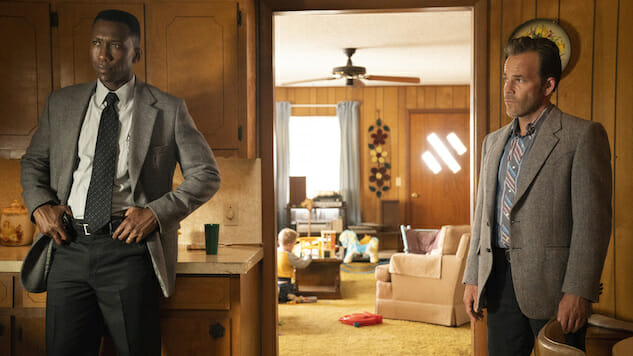True Detective: Hays and West Need Each Other More Than Ever in “If You Have Ghosts”
(Episode 3.05)
Photo: Warrick Page/HBO
The absolute least interesting thing about this season of True Detective is the Purcell case. I’m just saying.
The 1990 Purcell task force is looking for Julie, and already seemingly beset with thorny stuff. Wayne Hays (Mahershala Ali) looks tired, and only more so when someone sees him staring at pictures from 1980 and recalls that Hays had been at Bret Woodard’s house that day in 1980. We follow him into a flashback, to the moment last week’s episode cut to black, just before the angry mob set off that mine and Woodard (Michael Greyeyes) took out half a dozen guys. Hays tries to talk him down. Woodard isn’t having it, and Hays has to shoot him.
At this point, everyone who’s touched or been touched by the Purcell case is tainted, haunted and thoroughly screwed. The children’s father (Scoot MacNairy) is a bottomed-out alcoholic. Their mother (Mamie Gummer) is dead of an overdose. Bret Woodard has been tormented, threatened, beaten, hounded into very elaborately defending himself, killed by the police in a scary standoff, and posthumously convicted of the Purcell abduction/murder. Even the conviction itself is filthy. Hays is having marital problems that seem pretty directly related to Amelia’s (Carmen Ejogo) forthcoming book on the case. Freddy Burns (Rhys Wakefield), whose entire connection to the case seems to have involved loitering in a park and taking Will Purcell’s bike for a joyride, is looking like 40 miles of bad road and he’s maybe 27. He’s pissed off at Hays, and out of all the stuff Hays could be letting get to him Freddy Burns seems like a hell of a trivium, but isn’t it always something stupid that puts people over the edge? “Explain to me the trials of being a white man in this country,” he growls at Roland West (Stephen Dorff). “When I was his age I was in the fucking jungle. I make him skip college?”
-

-

-

-

-

-

-

-

-

-

-

-

-

-

-

-

-

-

-

-

-

-

-

-

-

-

-

-

-

-

-

-

-

-

-

-

-

-

-

-








































